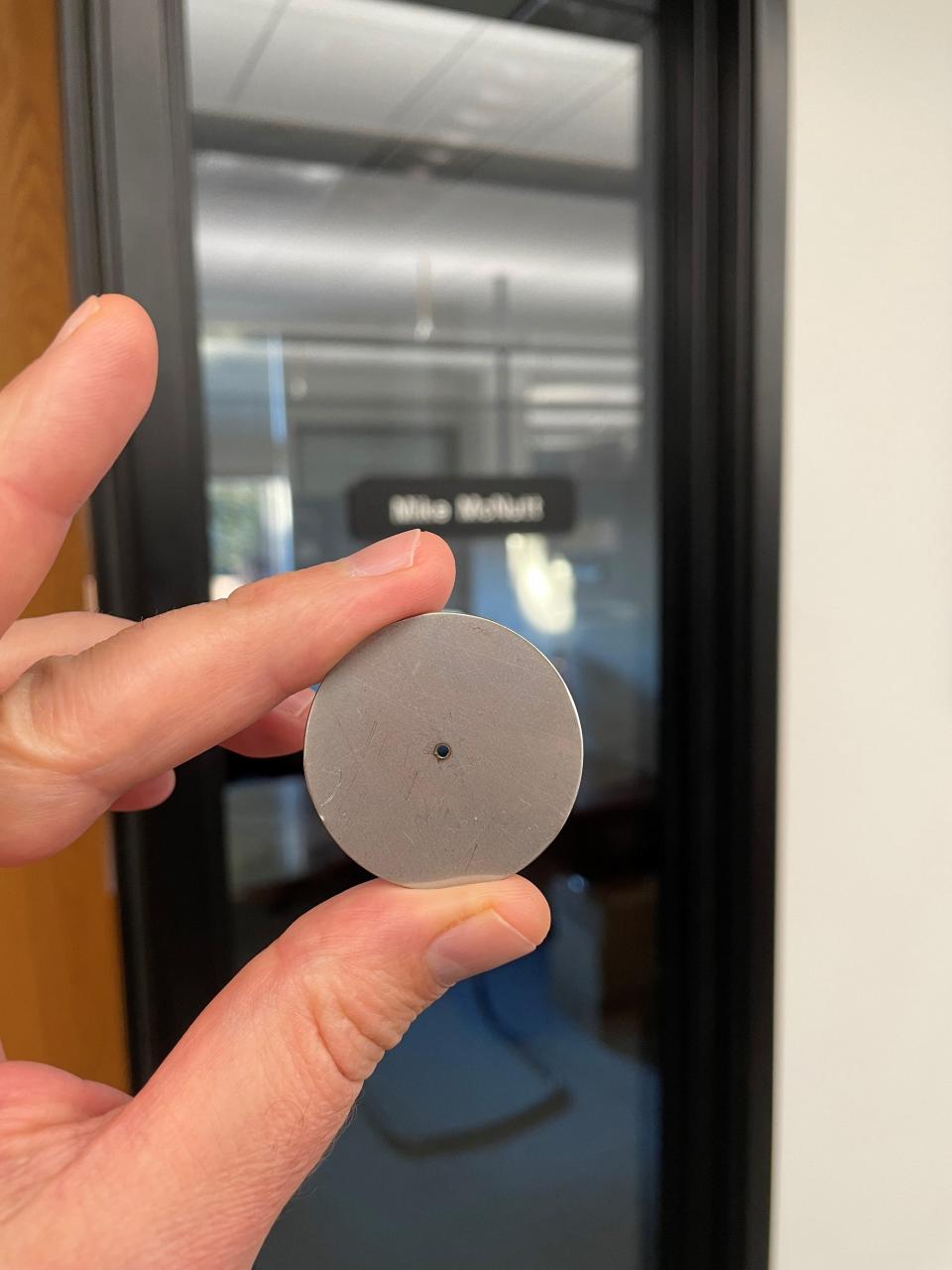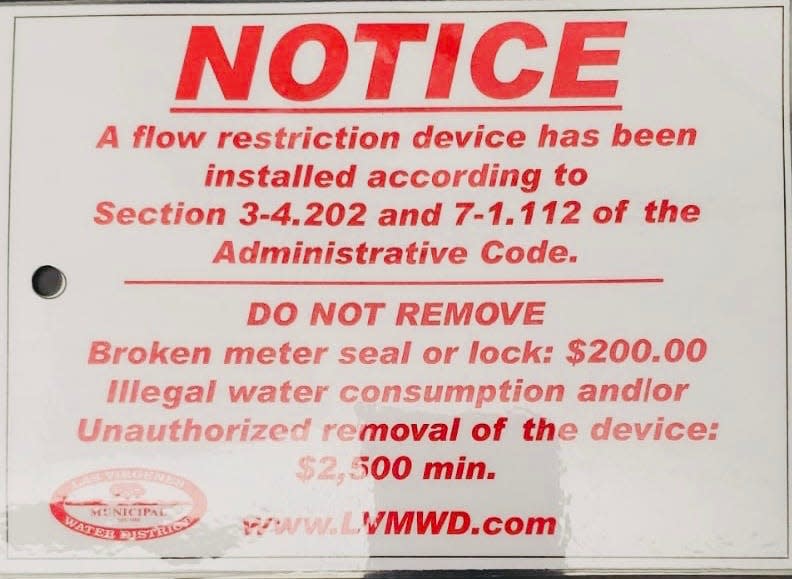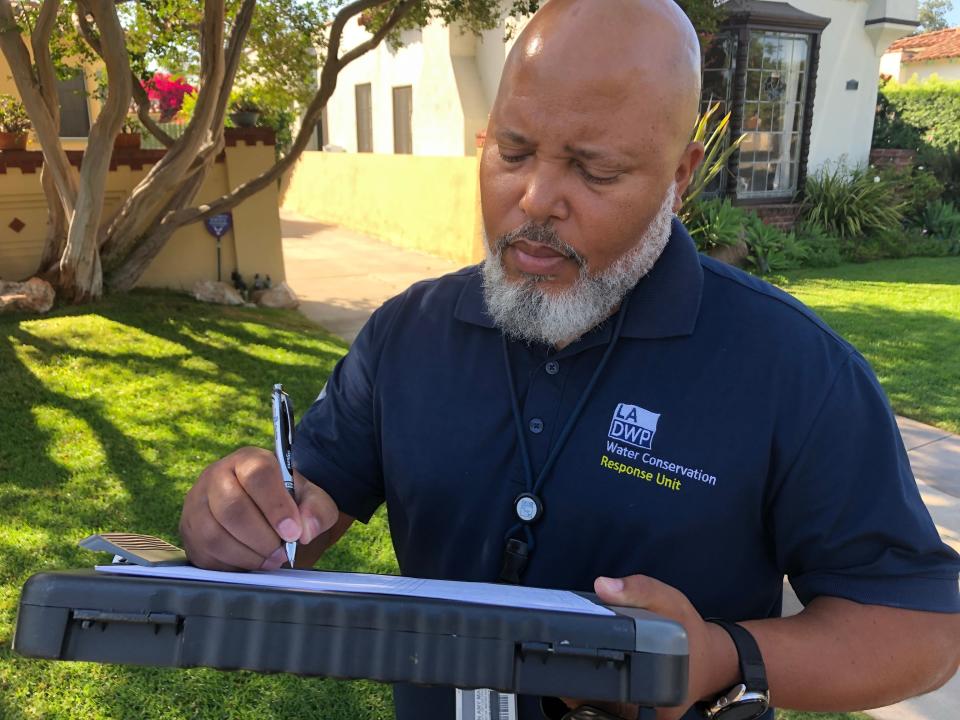In California's water crisis, neighbors turn in neighbors and even celebrities aren't spared
From working-class neighborhoods to the celebrity haunts of Malibu, residents in the Los Angeles area have been getting visits from what is essentially the water police as California remains in a near constant state of drought.
Six million Southern California residents are under the toughest water restrictions in the nation. And because of the patchwork of different agencies overseeing different areas, that means different rules for everyone, sometimes even neighbors who live across the street from each other.
Leading the charge is Las Virgenes Municipal Water District, which includes some of the richest areas of the region, including Calabasas, Hidden Hills, Agoura Hills, Westlake Village and parts of Malibu.
For the biggest water users among its 75,000 customers, the agency has begun installing devices that limit flow inside homes and completely cut it off from the outdoors. Since new restrictions went into place June 1, the agency has installed 56 of the flow restrictors, which are stainless steel discs 1 inch in diameter fitted to water meters. The discs have a tiny hole the size of 1/16th of an inch and that's where the water trickles through, meaning low-flow showers and less effective appliances.
Only seven of the 56 installed restrictors remain in place because residents made the necessary changes for them to be removed, said Las Virgenes spokesman Mike McNutt, adding that once the devices are installed, they're left in place a minimum of two weeks.
Another 1,600 customers are on the list to get flow restrictors but the agency only has the capability to install 20 a week, McNutt said.
What happens when taps run dry: A major Mexico city has lived it. A similar water crisis looms in the US, experts say.

'Nobody is getting preferential treatment'
And it doesn't matter whether your last name is Kardashian or Stallone, the agency promises residents that their status will not exempt them from flow restrictors.
"We're talking celebrities, people who are very wealthy, people who live in gated communities," McNutt said. "Nobody is getting preferential treatment."
So far, the agency has targeted the highest users of water, those who are quadrupling their allocated budgets. Among those who've been on the list include Sylvester Stallone, Kevin Hart, Kourtney Kardashian, Howie Mandell and Michael Jackson's estate, McNutt said.
Those celebrities and others can and have been able to get their names off the list before getting a device installed if they sign a water-use commitment form and lower their usage, he added.
While the agency monitors water use through meters, it also does neighborhood patrols like many other utilities in the region that are under restrictions, which include allowing residents to water their lawns only once a week.
The restrictions and penalties aren't sitting right with many residents.
Kitti McMeel, a 71-year-old portrait photographer living in Westlake Village, said she's been working hard to reduce her water use, but has now gotten three bills from Las Virgenes telling her she's over her monthly allotment. The most recent one told her she may be targeted for a flow restrictor.
"I wrote them an email because I was panicked," she said, citing a recent leak of her irrigation system that released about 600 gallons of water after she received a warning.
Since the new restrictions were announced, McMeel said she's been using a bucket to collect shower water that would otherwise be wasted while warming up and uses it for irrigation. She's also stopped rinsing dishes before putting them in the dishwasher and started combining whites and colors to cut down on laundry cycles, among other adjustments.
Since being notified she was over her allotment, she started a water diary to track her usage. It's all getting to be a bit too much.
"I would like to have a life besides worrying about my water," she said.
And if they install a flow restrictor on her home?
"I will figure out how to remove it myself or find someone who can remove it for me," she said.
Miriam Zacuto, a 60-year-old manager of a law practice who lives in nearby Agoura Hills, said she also believes in conservation but it feels like there's too much onus on the homeowners in her area.
Restrictions should be streamlined to apply to all Californians and the West, she said.
"We're not making any fuss about our allocation," she said. "We'd be happy to have our hill not die and our lawn be green again, but we also are nervous that at some point there will be no water coming out of the faucet."

On top of water patrols, most agencies in Southern California provide hotlines or online forms for residents to report wasters to the authorities.
It's not an earthquake: Experts warn California of a disaster 'larger than any in world history.'
Residents ratting out wasteful neighbors skyrocket
Lawrence Springer has been with the Los Angeles Department of Water and Power's conservation response unit for four years but has been extra busy since the new restrictions were announced in April.
People reporting on their neighbors have skyrocketed. (The department says there were 544 complaints in May 2021, compared with 1,198 in May 2022, a 120% increase.)
Springer responds to those reports on top of his regular neighborhood patrols, which range from working-class areas in South Los Angeles to million-dollar homes in the tony neighborhood of Hancock Park, home of Mayor Eric Garcetti and formerly Howard Hughes, Mae West and Nat King Cole.
Springer drives or walks around on the lookout for people watering their lawns past 9 a.m. or for sprinklers that end up watering cement.

On a recent sunny summer day in an upscale area of the Pico-Robertson neighborhood, Springer immediately spotted two homes violating his agency's rules. Sprinklers were spraying all over sidewalks so much that it created puddles along the curbs and flowed down the street.
"There may be a broken pipe," he said as he walked around the lush green lawn of a $2 million Spanish-style home.
But Lawrence doesn't knock on the door to see whether someone's home. Instead, he pulled out his clipboard and began filling out information about the house and the violation, information he'll use later to write a warning citation.
The first citation carries no fine. But a second costs $200, a third $400 and a fourth $600. It can escalate from there but because the restrictions are so new, no one has been cited since June 1.
"Ninety-nine percent of the population are receptive," Springer said. "They tend to want to make the corrections not only because they don't want to receive citations but also this is basically a waste of water and a waste of money. So they tend to want to make the correction so that they save water and save money in the process."
Many residents in the largely liberal region have embraced the new normal and made adjustments, like not flushing the toilet for urine alone, turning the shower off while shaving, and collecting the sink water that runs while waiting for it to get hot. Others have made the switch to artificial turf or irrigation systems for watering their yards.
The next message? 'No more lawns'
The adjustments are paying off. Los Angeles Department of Power and Water customers used 9% less water in June this year than June 2021, despite the month being hotter than any June in the past eight years, the agency said.
In the strict Las Virgenes district, water use in May fell by 21% since last May and by 42% in June, according to figures provided by McNutt.
He attributes the huge decreases to the area's large property sizes, which means that irrigation represents about 70% of water usage.
"So when conservation restrictions are put into place, we can see larger savings due to cutting back on outdoor watering," he said.
While homes in the area are now down to being allowed to water their lawns once a week, McNutt said residents need to start preparing for a time when they're not allowed to water outdoors at all.
"What were saying is no more lawns," he said. "All lawns will ultimately go dormant or turn brown or not live anymore. That’s the future of where were going with outdoor living spaces."
"In Southern California, we've been accustomed to having lush, green lawns, and as we move into the future, if we don't get a sufficient amount of snow and rain, it's going to get tough to justify having a green lawn when we can use the water for other reasons. Hopefully, we can move toward a more California landscape, but it's going take time and it's going to take education."
More coverage for USA TODAY subscribers
Eligible Americans aren't on WIC: With inflation and COVID, a baby formula shortage and food insecurity they should be
Texas Tech's 'disturbing pattern': School loses third women's coach in under two years
‘I don’t know if I will be deported’: Young immigrants prepare for DACA to end
Quiet quitting: Employees suffering pandemic burnout say they've just stopped working as hard
Are gun ads in FTC’s crosshairs?: Critics decry ‘toxic’ messaging as firearm sales soar
This article originally appeared on USA TODAY: California drought restrictions breed enforcement. Will it be even?

